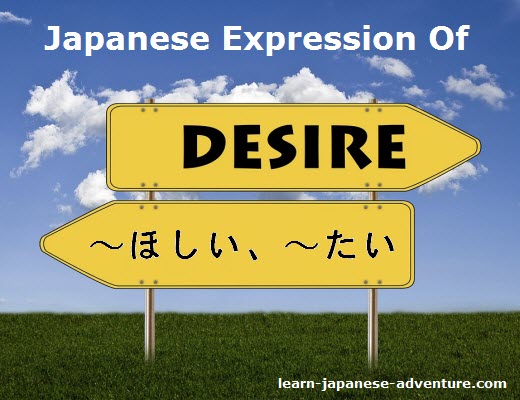- Home
- Intermediate Lessons
- Japanese Expression of Desire
Japanese Expression of Desire -
Learn Japanese Online
Intermediate Lessons: 1
In this first intermediate lesson, you are going to learn Japanese expression of desire for something (for noun) and desire to do something (for verb).

When you desire or want something (noun), the expression used is "欲しい" or "ほしい" (hoshii).
When you desire or want to do something (verb - since it's an action), the Japanese expression "verb {stem of masu-form} たい" (tai) is used.
While there are some other variations and functions for these two expressions such as when describing third person desire, this lesson will concentrate on the basic function of them.
I will discuss the other functions in future lessons.
Japanese Expression of Desire for Something
Let's take a look at the sentence pattern for the first expression...
(私は) Noun が ほしいです
(watashi wa) Noun ga hoshii desu
Take note that this expression is only used for first person, so it's always "watashi wa Noun ga hoshii desu". However "watashi wa" is normally omitted as it's obvious that the speaker is talking as the first person.
Therefore the following sentence is wrong because it's not the speaker's desire...
- 田中さんは犬 が ほしいです。 X
tanaka san wa inu ga hoshii desu X
Meaning: Mr Tanaka wants a dog. X
Note: This sentence is wrong because it's Mr Tanaka's desire
However you can ask someone (second person) what's his or her desire in a question. So you can use this expression in a question like the following...
- あなたは何 が ほしいですか。
anata wa nani ga hoshii desu ka
Meaning: What do you want?
In this expression, the thing that you desire (Noun) is marked with the particle が (ga). This is the rule that you have to remember.
For the object Noun, it can be a) thing, b) people and c) time. Let's use some examples to further see how this Japanese expression works...
a) Thing
- 今日はとても暑いです。私は冷たいジュース が ほしいです。
kyou wa totemo atsui desu. watashi wa tsumetai ju-su ga hoshii desu
Meaning: Today is very hot. I want cold juice.
- 今日は雨が降っています。傘 が ほしいです。
kyou wa ame ga futte imasu. kasa ga hoshii desu
Meaning: Today is raining. I want an umbrella.
b) People
- 私は恋人 が ほしいです。
watashi wa koibito ga hoshii desu
Meaning: I want a boyfriend/girlfriend.
- 私は日本人の友達 が ほしいです。
watashi wa nihonjin no tomodachi ga hoshii desu
Meaning: I want a Japanese friend.
c) Time
- 私はとても忙しいから、時間 が ほしいです。
watashi wa totemo isogashii kara, jikan ga hoshii desu
Meaning: I want time because I am so busy.
Negative and Past Tense of ほしい (hoshii)
As ほしい (hoshii) is an i-adjective, the negative form and past tense (affirmative and negative) follow how an i-adjective changes form. Take a look at the following...
| Present Affirmative: | ほしいです |
| Present Negative: | ほしくないです |
| Past Affirmative: | ほしかったです |
| Past Negative: | ほしくなかったです |
Let's make some examples to explain the various forms clearly...
- 子供の時人形 が ほしかったですが、今はほしくないです。
kodomo no toki ningyou ga hoshikatta desu ga, ima wa hoshikunai desu
Meaning: I wanted a doll when I was a kid, but I don't want it anymore now.
- 五年前にカメラ が ほしくなかったですが、今はほしいです。
gonen mae ni kamera ga hoshikunakatta desu ga, ima wa hoshii desu
Meaning: I didn't want a camera 5 years ago, but I want it now.
Bear in mind the Japanese expression ほしい (hoshii) is only used for things/objects. You cannot use it when you have desire to do something (action).
A common mistake student often made is the following sentence...
- 私は寝ます が ほしいです。 X
watashi wa nemasu ga hoshii desu X
Meaning: I want to sleep. X
Note: This sentence is wrong since nemasu is a verb.
Note: You can actually connect Verb to ほしい (hoshii), but you've to change the verb to て-form (te-form) first: Verb (て-form) ほしい. However, Verb (て-form) ほしい has a different meaning from the above which will be discussed in one of the future lessons. Just bear in mind that you cannot connect verb directly to ほしい (hoshii) unless you change it to て-form (te-form).
For own desire to do something (action), you need to use the next Japanese expression of desire to do something.
Japanese Expression of Desire to Do Something
Let's take a look at the sentence pattern for this Japanese expression...
Verb {stem of masu-form} たいです
Verb {stem of masu-form} tai desu
Check out the page on Japanese verb stem of masu-form if you are not sure how to form it. Let's make use of few verbs to see how to change into the respective たい-form (tai-form)...
| dict-form | masu-form | tai-form | Meaning | |
| 1. | 買う | 買います | 買いたい | want to buy |
| 2. | 待つ | 待ちます | 待ちたい | want to wait |
| 3. | 乗る | 乗ります | 乗りたい | want to ride |
| 4. | 飲む | 飲みます | 飲みたい | want to drink |
| 5. | 死ぬ | 死にます | 死にたい | want to die |
| 6. | 遊ぶ | 遊びます | 遊びたい | want to play |
| 7. | 行く | 行きます | 行きたい | want to go |
| 8. | 泳ぐ | 泳ぎます | 泳ぎたい | want to swim |
| 9. | 話す | 話します | 話したい | want to talk |
| 10. | 見る | 見ます | 見たい | want to see |
| 11. | する | します | したい | want to do |
| 12. | くる | きます | きたい | want to come |
たい-form (tai-form) is also similar to ほしい (hoshii) that it is only used for first person. Therefore it's wrong to say "someone (other than yourself) verb(~tai) desu".
But it's Ok to use it when asking someone "what he or she wants to do" in a question.
For たい (tai) sentence, you can still use the particles as per normal. However sometimes particle を (wo) is changed to が (ga).
It's Ok to use either of them, but most of the time が (ga) is used. Let's check out some examples for this Japanese expression...
- ジュース を/が 飲みたいです。
ju-su wo/ga nomitai desu
Meaning: I want to drink juice.
- 本屋 へ 行きたいです。
honya e ikitai desu
Meaning: I want to go to the bookstore.
- 電車 に 乗りたいです。
densha ni noritai desu
Meaning: I want to get on the train.
- 日本語の新聞 を/が 読みたいです。
nihongo no shinbun wo/ga yomitai desu
Meaning: I want to read Japanese newspaper.
Negative and Past Tense of Verb たい (tai) form
Similar to ほしい (hoshii), verb tai-form is also an i-adjective. Therefore the same rule applies when changing form to negative and past tense.
Please see the following for a clearer picture...
| Present Affirmative: | ~たいです |
| Present Negative: | ~たくないです |
| Past Affirmative: | ~たかったです |
| Past Negative: | ~たくなかったです |
Let's make some similar examples as you have done in the other Japanese expression "hoshii" to explain the various forms clearly...
- 今朝はビール が 飲みたくなかったですが、今は飲みたいです。
kesa wa bi-ru ga nomitakunakatta desu ga, ima wa nomitai desu
Meaning: I didn't want to drink beer this morning, but I want to drink now.
- 子供の時は公園 で 遊びたかったですが、今は遊びたくないです。
kodomo no toki wa kouen de asobitakatta desu ga, ima wa asobitakunai desu
Meaning: I wanted to play at the park when I was a kid, but I don't want to play now.
Mystery Sales! Get 45% Forever OFF Premium & Premium PLUS! Ends on 20 Feb 2026
The link above is an affiliate link, which means that I would earn a commission (at no extra cost to you) if you do end up purchasing the related learning course.
Buy me a coffee








Facebook Comments
Don’t see the comments box? Log in to your Facebook account, give Facebook consent, then return to this page and refresh it.